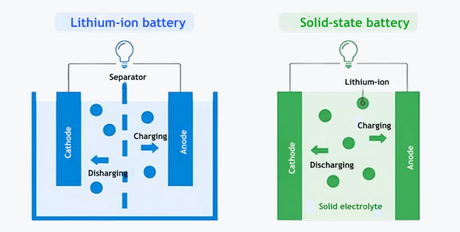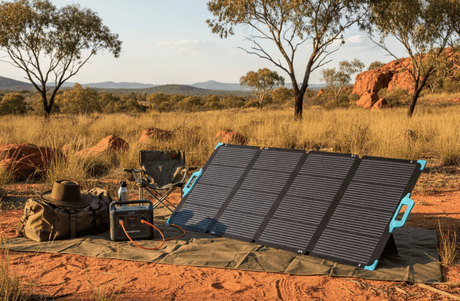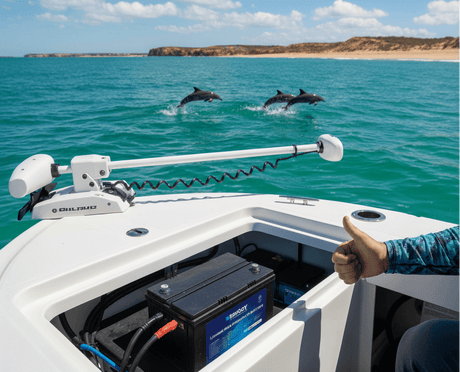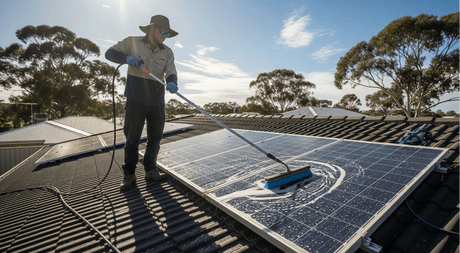Lithium Batteries for Caravans - The Ultimate Guide for Australian Travellers
Renogy Australia is dedicated to providing high-quality, reliable power solutions for caravanning enthusiasts. With the increasing popularity of lithium batteries in recent years, it's important to understand their benefits and how they can enhance your caravan experience.
This blog post aims to provide a comprehensive guide on lithium batteries for caravans and their importance in ensuring a comfortable and enjoyable journey. We'll cover various aspects of lithium batteries, including their types, advantages, selection, installation, charging, maintenance, and frequently asked questions.
In this article, we will discuss:
- Section 1: Understanding Lithium Batteries
- Section 2: Choosing the Right Lithium Battery for Your Caravan
- Section 3: Installing Lithium Batteries in Your Caravan
- Section 4: Charging Lithium Batteries
- Section 5: Maintaining and Monitoring Your Lithium Battery
- Section 6: Frequently Asked Questions
Section 1: Understanding Lithium Batteries
The Most Common Types of Lithium Batteries for caravans
While lithium batteries come in a few different types, the two most common for deep-cycle boats and caravan use are Lithium-Ion and Lithium Iron Phosphate (LiFePO4).
In many aspects, LiFePO4 batteries surpass their lithium-ion counterparts. With a lower risk of combustion and thermal runaway, lithium iron phosphate batteries offer enhanced safety for home and mobile use. They also have an extended cycle life allowing them to outperform lithium-ion batteries by up to five times in terms of longevity.
Advantages of Lithium Batteries Over Traditional Lead-Acid Batteries
Longer Lifespan
A caravan lithium battery can last up to 10 years or more, depending on usage and maintenance. However, lead-acid batteries typically have a lifespan of 3-5 years.
Faster Charging Times
Lithium batteries offer an excellent advantage over traditional lead-acid batteries when it comes to charging speed, which can greatly enhance the experience of your journey.
One of the key features of a lithium battery for caravan is its ability to accept higher amperage during the charging process. This means they can handle a greater flow of electrical current, allowing for a faster charge time than lead-acid batteries. LiFePO4 batteries can usually be charged up to 3-4 times faster, significantly reducing downtime during your trip.
The rapid charging capability of these batteries is particularly beneficial for those who rely on their mobile power sources during long travels. With reduced charging times, you can spend more time enjoying your adventures and less time waiting for your batteries to recharge.
LiFePO4 batteries also have a higher energy efficiency than lead-acid batteries. This means that a greater percentage of the energy consumed during charging is actually stored in the battery rather than being lost as heat. This means not only do lithium batteries charge more quickly, but they also make better use of the available energy, ultimately saving you time and resources.
In short, lithium batteries provide a substantial advantage in terms of charging speed compared to traditional lead-acid batteries. Lithium batteries are an excellent choice for those seeking a reliable and efficient power source for their mobile adventures.
Higher Energy Density
Lithium batteries can store way more energy in a smaller, lighter package than lead-acid batteries, which means less weight and space in your caravan. Gone are the days of having to dedicate an entire cabinet to batteries unless you have extensive power needs, that is.
Lower Self-Discharge Rate
Other batteries are prone to bleeding current at a low rate when not in use. This is called a self-discharge rate. Lithium batteries lose charge much slower when not in use, ensuring longer periods of power availability.
Greater Depth of Discharge
Lead acid batteries should never be discharged below fifty percent, or you'll damage the cells and severely impact the battery's capacity. Lithium batteries, on the other hand, can be discharged more deeply, consistently up to 80%, without damaging the battery, allowing you to use more stored energy.
Safety Concerns and How Modern Lithium Batteries Address Them
Lithium batteries have faced safety concerns due to overheating and thermal runaway issues. However, modern lithium batteries, especially LiFePO4, have addressed these concerns with built-in safety features and improved chemistry, making them a safe and reliable choice for caravans.
For more details, look at:
Choosing The Best Solar Battery: AGM Vs. Lithium Battery.
Smart Lithium Iron Phosphate Batteries For Solar: What Are The Benefits?

Section 2: Choosing the Right Lithium Battery for Your Caravan
When selecting a lithium battery for a caravan, consider the following factors:
Capacity (Ah) and Voltage (V)
Select a battery with sufficient capacity to meet your power needs and a voltage compatible with your caravan's electrical system. A higher-capacity battery will provide more energy storage, allowing you to run appliances and devices for longer periods.
Size and Weight
Ensure the battery fits in the available space and does not add excessive weight to your caravan. Remember that lithium batteries are generally lighter than lead-acid batteries, which can help reduce the overall weight of your caravan.
Battery Management System (BMS)
Opt for a battery with a built-in BMS to protect it from overcharging, overheating, and other potential issues. A BMS monitors the battery's performance, ensuring optimal operation and extending its lifespan. We also offer external BMSs to allow more flexibility.
Compatibility with Your Caravan's Electrical System
Ensure the battery is compatible with your caravan's electrical system and charging methods. Some lithium batteries may require specific chargers or adapters to work correctly with your electrical setup.
Budget
Select a battery that meets your requirements and falls within your budget. Remember that while lithium batteries may have a higher upfront cost, their longer lifespan and superior performance can save you money in the long run.
Renogy Australia's Recommended Lithium Batteries for Caravans
Renogy offers a range of high-quality lithium batteries suitable for caravans. Many of our batteries include ground-breaking features like Bluetooth for monitoring your battery status in real-time and even built-in heating for colder temperatures.
Some of our top choices for batteries to use in your caravan are:
12V 100Ah Smart Lithium-Iron Phosphate Battery w/ Self-Heating Function
At 100Ah (amp-hours), this battery must be charged more often than our 170Ah or 200Ah batteries. It makes up for in compact size and features. A few key features it comes standard with are:
● Auto balancing helps ensure a long life of more than 4000 cycles
● Self-heating that automatically kicks in when the battery core drops below 5°C
● Integrated Battery Management System (BMS) that provides more than 20 different protections for your battery, including overheating protection
12 Volt 170Ah Lithium-Iron Phosphate Battery
This is one of the best all-around batteries that we offer for caravaning. It offers great value in both terms of weight and price. Standard features included are:
● Lightweight design offers more flexibility than some of its competition
● Integrated Battery Management System for protection of key components
● Low self-discharge, meaning it doesn’t need a maintenance charge as often
12V 200Ah Lithium Iron Phosphate Battery w/ Bluetooth
This is one of our larger capacity batteries and is ideal for larger systems or anyone that wants to have a single battery to power their caravan, boat, or off-grid property. Some standard features include:
● Real-time monitoring through the integrated Bluetooth module
● Auto Balancing that ensures a long life
● Upgradeability that makes it easy to keep your power system expanding
These are just a few of the batteries we offer. Check out our lithium batteries catalogue or contact our team for tailored recommendations based on your needs.
Section 3: Installing Lithium Batteries in Your Caravan
Preparing Your Caravan for the Installation
Before installing a lithium battery, assess the available space in your caravan and ensure proper ventilation to prevent overheating. Determine whether you're comfortable performing a DIY installation or prefer to seek professional assistance.
Connecting the Lithium Battery to Your Caravan's Electrical System
Follow the manufacturer's instructions and guidelines for connecting the battery. Use appropriate cables, connectors, and fuses to ensure a safe and secure connection. Proper installation is essential for optimising battery performance and longevity. We have many articles and videos on Renogy's site to give you a leg up on installing your equipment.
Section 4: Charging Lithium Batteries
Different Charging Methods
Lithium batteries can be charged using various methods, including:
● Solar panels: Harness the sun's power to charge your battery using Australia's abundant sunshine.
● Main power: When available, use a compatible charger to charge your battery from a power outlet.
● Vehicle alternator: Charge your battery while driving using a DC-DC charger to ensure optimal charging performance.
Selecting a Compatible Charger for Your Lithium Battery
Choose a charger specifically designed for lithium batteries for caravansto ensure optimal charging performance and prevent damage to the battery.
Section 5: Maintaining and Monitoring Your Lithium Battery
Importance of Regular Battery Maintenance
Regular maintenance ensures your lithium battery's optimal performance and lifespan. This includes cleaning and inspecting connections, checking for signs of damage or wear, and updating the BMS firmware as needed.
One of the most often-overlooked but simple maintenance routines is tightening the terminal connections on the battery. Failing to do this can cause damage to components down the line as well as overheating the battery and terminals themselves.
Monitoring Your Battery's State of Charge (SOC) and Other Parameters
Use a battery monitor to keep track of the battery's SOC, voltage, temperature, and other essential parameters. This information can help you manage your power usage and ensure your battery remains in good condition.
Understanding the importance of monitoring your lithium battery setup for caravan and energy system led Renogy to develop the Renogy ONE. This is an all-in-one battery and system monitoring device designed to be the heart of your off-grid and caravan system. It pairs with and allows monitoring for all of the Renogy devices in your caravan or home, all on one screen.
If you need a more mobile solution to monitor your energy system, Renogy also offers the Renogy DC Home App, available in most mobile app stores. This app allows similar monitoring and control to the Renogy ONE all at your fingertips.

Section 6: Frequently Asked Questions
Can I use my existing lead-acid charger for a lithium battery?
No, you should use a charger specifically designed for lithium batteries to ensure proper charging and prevent damage to the battery.
How long does a lithium battery last in a caravan?
Lithium batteries typically last ten years or more, depending on usage and maintenance. Many Lion batteries are tested to 2000-4000 cycles at 80% discharge. The way you use them and your maintenance routine will have a significant impact on their lifespan.
How do I dispose of a lithium battery at the end of its life?
Lithium-ion batteries, commonly used in various electronic devices and vehicles, require special care when it comes to disposal. It is important to note that they should never be thrown into household waste bins or recycling bins. Improper disposal of these batteries can lead to fires during waste collection, transportation, handling, and processing, posing significant risks to both the environment and public safety.
To ensure the proper disposal of lithium-ion batteries, make sure they are undamaged, meaning they are not swollen, punctured, or leaking. Once you have confirmed the battery's condition, it can be safely disposed of at a designated battery recycling drop-off point. These dedicated facilities are specifically designed to handle and process lithium-ion batteries in a safe and environmentally responsible manner.
In Australia, there are various locations where you can find battery recycling drop-off points, such as local council offices, libraries, and selected retail stores. Many of these locations participate in programs like Battery Stewardship Council (BSC) or Australian Battery Recycling Initiative (ABRI), which aim to promote responsible battery disposal and recycling.
Before disposing of a lithium-ion battery, it is also recommended to check with the manufacturer or retailer of the device for any specific disposal instructions or recycling programs they may offer. Some companies provide their customers with convenient solutions for recycling their products, ensuring that the batteries are handled correctly and safely.
By taking the time to dispose of lithium-ion batteries properly, you are contributing to a safer and cleaner environment for future generations. Remember to always follow the appropriate guidelines and utilise designated recycling facilities to prevent potential hazards and protect our planet.
Are lithium batteries safe for use in caravans?
Modern lithium batteries, particularly those using Lithium Iron Phosphate (LiFePO4) chemistry, like our offerings here at Renogy, have proven to be a safe and dependable choice for powering caravans.
Lithium-ion batteries come in various chemistries, each with its own set of characteristics. Among these, LiFePO4 stands out as a preferred choice for caravans due to its properties.
LiFePO4 batteries are known for their exceptional thermal and chemical stability. This means that they are less likely to overheat or catch fire compared to other lithium-ion chemistries, making them a safer option for caravans.
When it comes to choosing house batteries for your caravan or other mobile use, lithium batteries are one of the most reliable and safe choices, which is why we use them in our own rigs.
Conclusion
Lithium batteries offer numerous advantages over traditional lead-acid batteries, making them the ideal choice for powering your caravan. By understanding the benefits, choosing the right battery, and following best practices for installation, charging, and maintenance, you can enjoy a better caravanning experience. Don't hesitate to reach out to Renogy Australia for further assistance and product recommendations.
Click on the picture, join in the promotion right away
Related articles:
Lithium Battery Chargers For Beginners
Choosing the Correct Solar Battery Charger
Solar Battery Price: Is it Worth the Cost?
Optimal Voltage Levels For A Fully Charged 12V Battery
Everything You Need To Know About Lithium Battery Charging Cycles










![What Is a DC to DC Battery Charger [Comprehensive Guide]](http://au.renogy.com/cdn/shop/articles/IMG_3829_bd86de74-31d6-49fd-b9d5-265bb723091d.jpg?v=1757582605&width=460)



